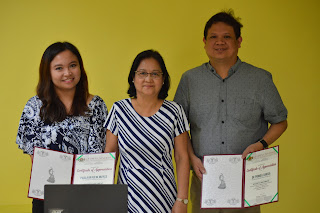by Ma. Rosette San Buenaventura
Dr. Odine Maria M. de Guzman, director of the UP Center for Women’s and Gender Studies, talked about Gender-Sensitivity Research at Research Conversations last 25th of August 2017. The event was organized by UPOU’s Office of the Vice Chancellor for Academic Affairs in partnership with the Office of Gender Concerns. It was a two-part talk that discussed concepts on gender and gender research.
The speaker started the talk with determining what the researcher’s disposition should be when doing gender research. The researcher must be open-minded, adaptable, flexible, and most of all, gender-sensitive. Dr. Odine proceeded to define gender as “socially-ascribed and socially-learned sense of what and who we are” and that it is different from sex which is understood to be biologically determined. She also differentiated gender roles from sex roles such that the former are tasks, functions, or characteristics that a society or culture defines as female or male, while the latter are biological or occupational function for which a necessary qualification is to belong to one particular sex category.
Dr. Odine also defined and discussed gender issues. These issues arise when there is notable gender inequality in real world situations such as gender relations and roles, gender division of labor, organizational structures, programs and services, and laws and government directives. Sexism and discrimination were mentioned as examples of this. Gender stereotypes were defined as a widely accepted overly simplified judgment or bias about a person or group. These gender issues impact individuals in such a way that “gender roles, expectations, and perceptions categorize and limit women and men into situations that constrain their capacity to do and capacity to be, hindering their potential to attain a full and satisfying life”.
Dr. Odine went on to tackle gender-sensitive research. A common misconception about gender research is that it is solely about women or gender relationships. Also, contrary to traditional research, it does not operate on assumptions of homogeneity. It takes into account gender as a significant variable in the research context and in the whole research process. It recognizes that the sexes have different roles and impact to society, power and power relations among the sexes and genders, and the differences in genders and gives equal value to each.
Engendering research, as Dr. Odine put it, presents new perspectives, raises new questions, and uses new analytical tools to create a better understanding of a situation. Moreover, it can improve relevance, coverage, and quality of research. Engendering research also contributes to empowering groups through the use of more participatory methodologies, presenting and valuing the experiences of marginalized groups, and better policy formation. Dr. Odine reiterated that an actual research must mainstream gender throughout the research process from identifying the problem down to the dissemination of the research results. She gave important points to consider when doing gender research such as acknowledge own bias, use a conceptual framework that could reflect the experiences of sexes and genders, formulate a gender sensitive research question, among others.
The speaker started the talk with determining what the researcher’s disposition should be when doing gender research. The researcher must be open-minded, adaptable, flexible, and most of all, gender-sensitive. Dr. Odine proceeded to define gender as “socially-ascribed and socially-learned sense of what and who we are” and that it is different from sex which is understood to be biologically determined. She also differentiated gender roles from sex roles such that the former are tasks, functions, or characteristics that a society or culture defines as female or male, while the latter are biological or occupational function for which a necessary qualification is to belong to one particular sex category.
Dr. Odine also defined and discussed gender issues. These issues arise when there is notable gender inequality in real world situations such as gender relations and roles, gender division of labor, organizational structures, programs and services, and laws and government directives. Sexism and discrimination were mentioned as examples of this. Gender stereotypes were defined as a widely accepted overly simplified judgment or bias about a person or group. These gender issues impact individuals in such a way that “gender roles, expectations, and perceptions categorize and limit women and men into situations that constrain their capacity to do and capacity to be, hindering their potential to attain a full and satisfying life”.
Dr. Odine went on to tackle gender-sensitive research. A common misconception about gender research is that it is solely about women or gender relationships. Also, contrary to traditional research, it does not operate on assumptions of homogeneity. It takes into account gender as a significant variable in the research context and in the whole research process. It recognizes that the sexes have different roles and impact to society, power and power relations among the sexes and genders, and the differences in genders and gives equal value to each.
Engendering research, as Dr. Odine put it, presents new perspectives, raises new questions, and uses new analytical tools to create a better understanding of a situation. Moreover, it can improve relevance, coverage, and quality of research. Engendering research also contributes to empowering groups through the use of more participatory methodologies, presenting and valuing the experiences of marginalized groups, and better policy formation. Dr. Odine reiterated that an actual research must mainstream gender throughout the research process from identifying the problem down to the dissemination of the research results. She gave important points to consider when doing gender research such as acknowledge own bias, use a conceptual framework that could reflect the experiences of sexes and genders, formulate a gender sensitive research question, among others.
watch the recording of the conversation at: https://www.youtube.com/watch?v=VBA7wayHJoI&list=PLiqeNUxu5x2HMuySXKnMcHzgTBeIovfH7&index=20 and https://www.youtube.com/watch?v=6UlqMJwSr8w&list=PLiqeNUxu5x2HMuySXKnMcHzgTBeIovfH7&index=19




